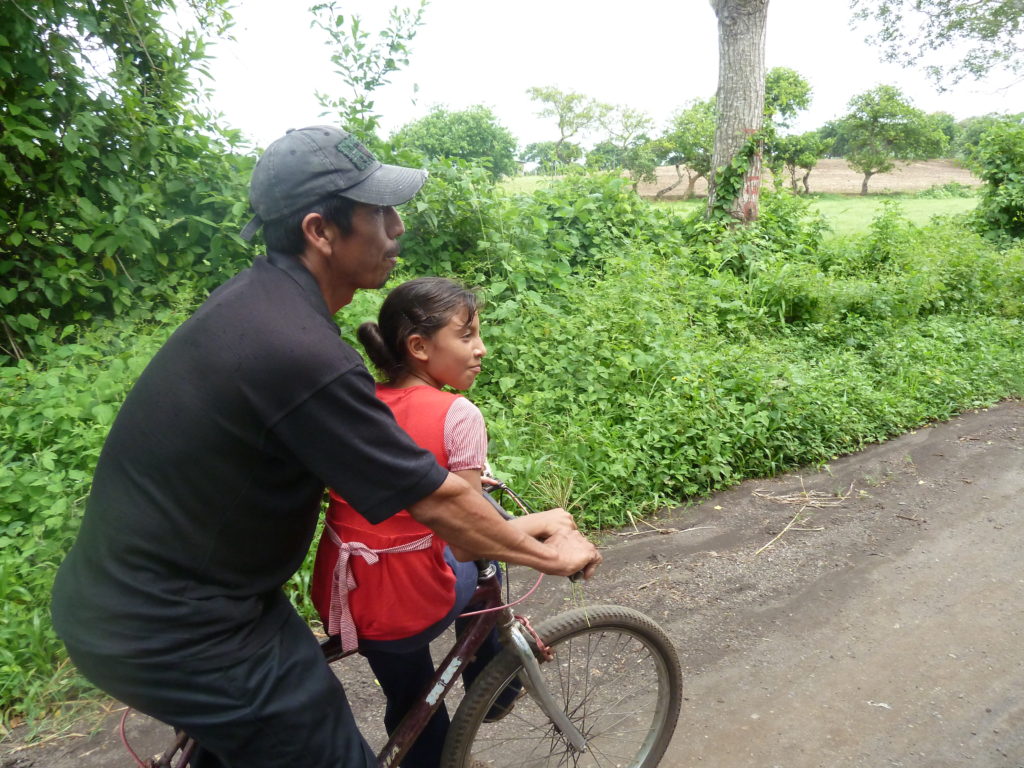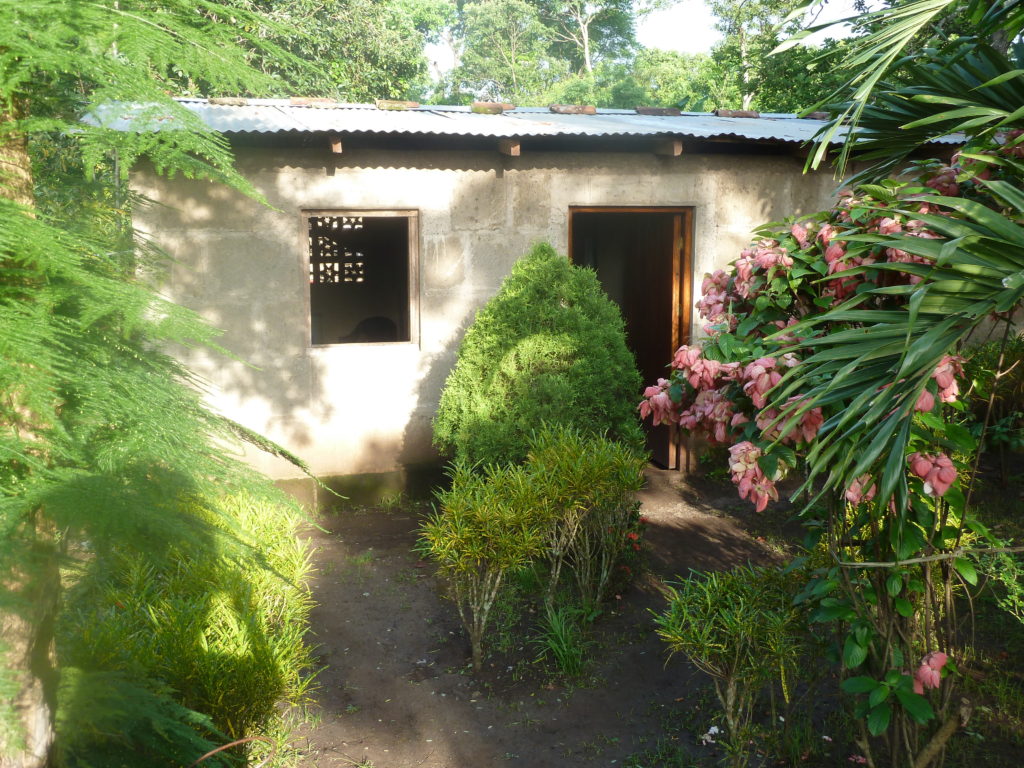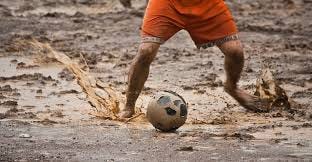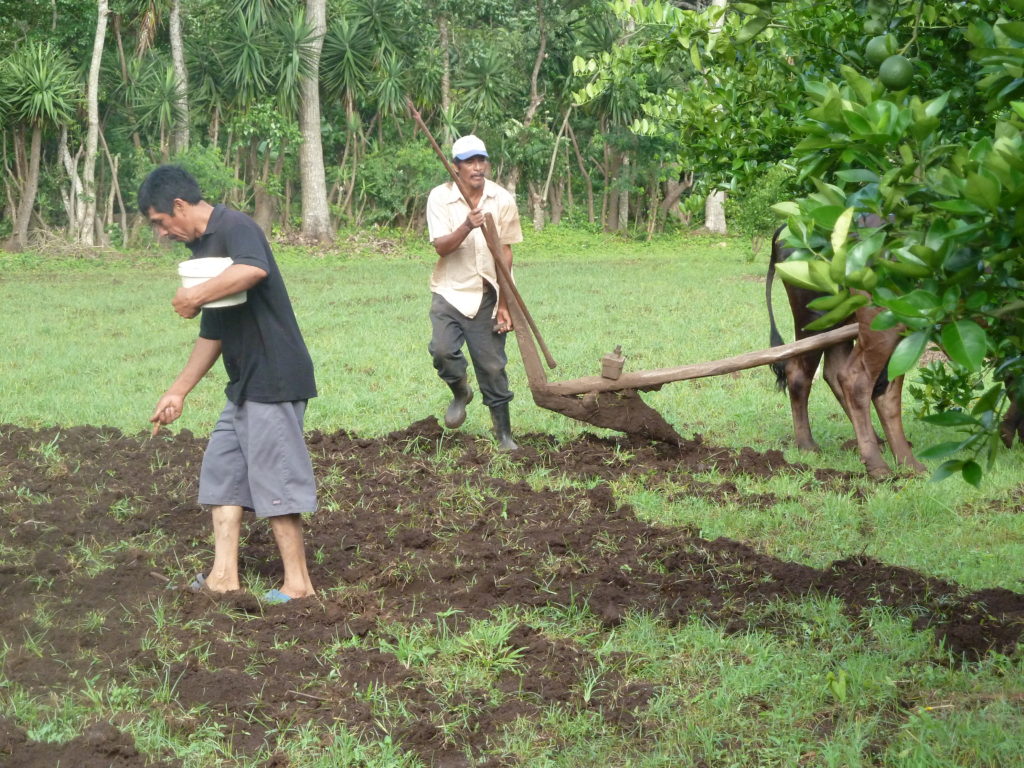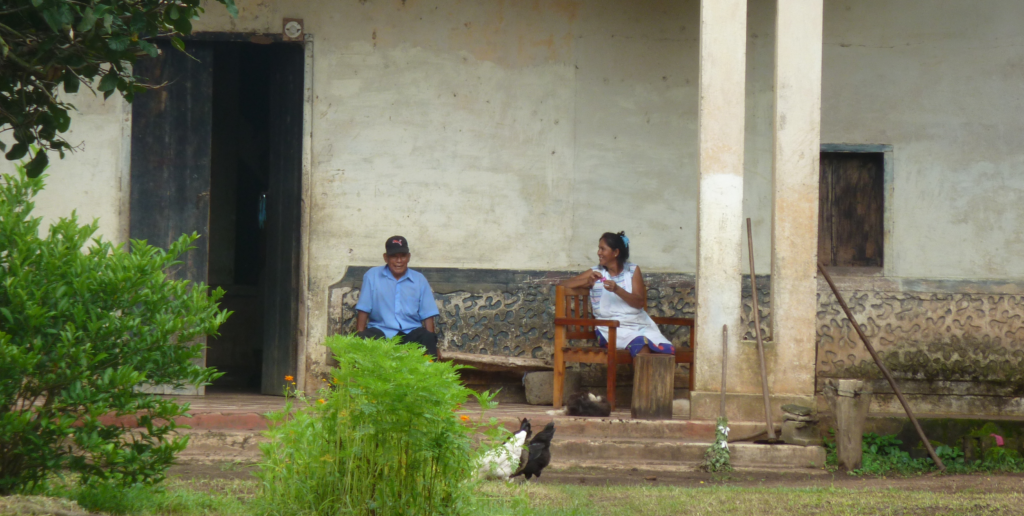“The river swells. A white goose waddles out from a farmyard to ride the rapids, then disembarks and does it again. In a head-to-toe navy slicker and tall rubber boots, an ice cream man pushes his cart through the whitecaps. His thumb rings a bell …”
El Rosario Road
Splay-leafed palms spike the fencerows. An avocado tree sweeps a tin roof with broad, waxy leaves, making every breath of wind an impending storm.
Each footstep, hoofbeat, and turn of a rubber tire on the road sounds the purpose of some routine journey: a woman sells milk from a white cooler on her head; a policeman in cerulean uniform straddles a gleaming blue motorcycle; a horse-drawn cart carries a family of four on a pile of burlap sacks; a mother in a pink shirt shouts, “¡Arriba! ¡Arriba!” at a black-backed mutt scampering to keep up; a man on a bike sways with the weight of a green plantain stem three times as wide as the bike.
And when afternoon eases to evening, the sky falls. Rain on the roof sounds like it could swallow everything.
The road becomes a river. But whoever is going somewhere, goes.
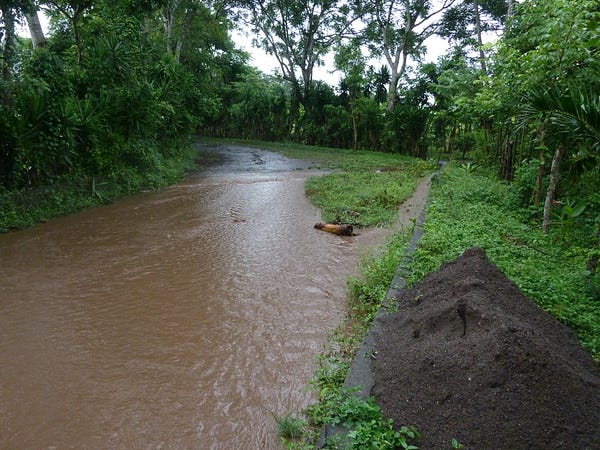
T-shirts cling to backs. A megaphone on top of a pickup carrying half a dozen boys, all crouched in the bed under a rumpled tarp, crackles, “¡Chancho!” for pork.
The river swells. A white goose waddles out from a farmyard to ride the rapids, then disembarks and does it again. In a head-to-toe navy slicker and tall rubber boots, an ice cream man pushes his cart through the whitecaps. His thumb rings a bell, muted by the downpour.
Two soaked men careen a bike toward town, kicking up silty waterfalls. One man pedals; the other perches on the handlebars — chineando, they say here — the same word used to describe cradling a baby.
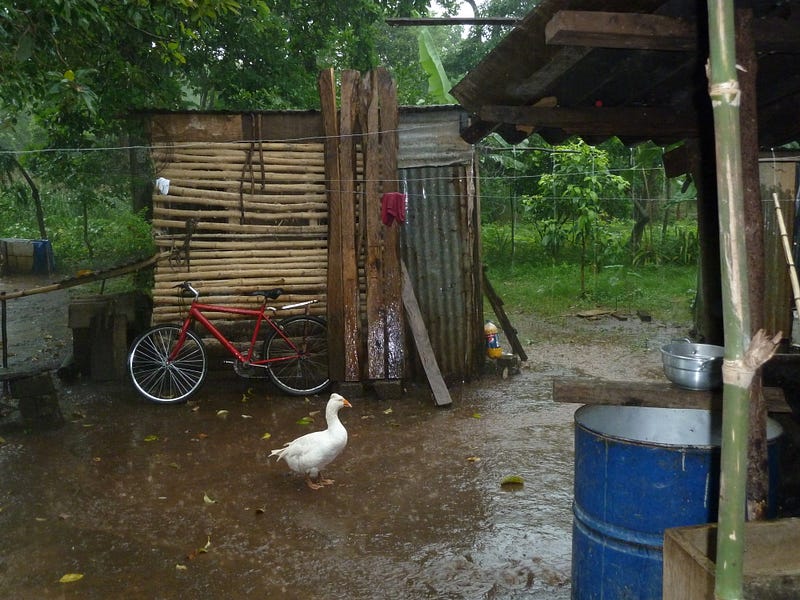
*
The name of the country where this happens doesn’t matter. El Rosario Road isn’t paved. You won’t find it in a travel guide, though it connects nowheres everywhere. It’s the road every traveler seeks.
*
After the rain almost imperceptibly stops pattering the roof, pairless flip-flops and plastic bags swirl in the road’s gullies. The goose’s honks puncture the post-storm stillness. A steady thud, thud, thud of avocados strikes the softened earth.
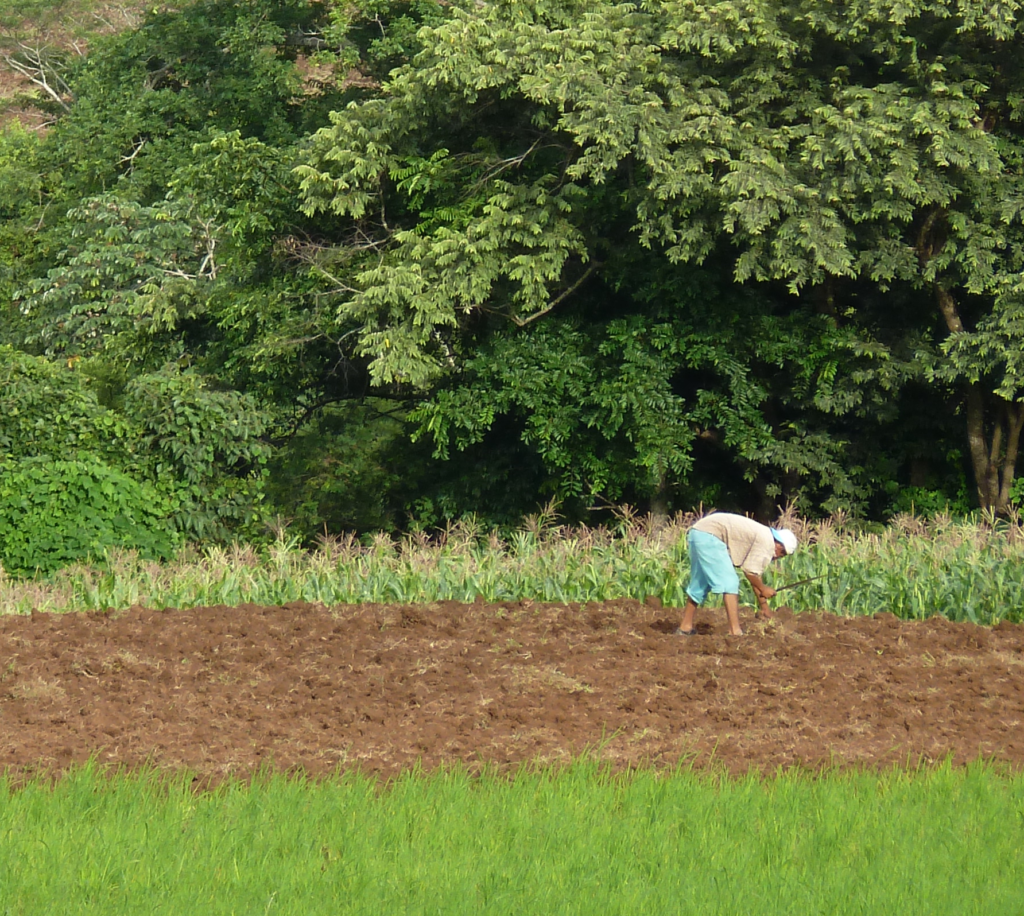
Then a flood of new sounds as households are born again: Water sloshes back and forth over laundry in a washboard sink; a scrub brush rasps against thin metal pots; broom bristles scrape a living room’s packed-dirt floor; a moon-faced boy whistles Tseet, tseet, tseet, and chicks go into a frenzy around his red-sandaled feet; plastic bowls of water slide over bare skin, then slap a shower’s concrete floor; a rising voice crests in “¡Sííí, hombre!” and falls in cascades of laughter.
Someday soon, they say, the road will be paved. Motors will mute this symphony. Traffic will no longer stop for family soccer in the road.
But children won’t arrive at school slicked with mud. Crops will get to market before they rot. Taxis will take women loaded with groceries all the way home, instead of leaving them by the highway to walk through fields of rice and beans.
Will the spell survive? Will the glowing guardabarranco still land on the fence beside the road, linger a few seconds flicking its double-diamond tail, and then fly away? Will the watermelon man still halt his ox cart in front of every house, until someone rushes out and trades bills for sticky chins and kids spitting seeds into cups as they holler, “¡Gooooooooooooooool! David Villa!” Will the cries of babies still carry from home to home?
Will we become what we make the road?
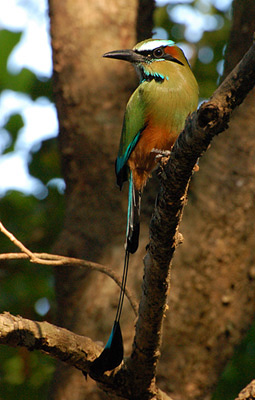
Douglas Haynes is a nonfiction writer and poet whose work has appeared in Virginia Quarterly Review, Orion, Boston Review, Bellevue Literary Review, and many other publications. His narrative nonfiction book, Every Day We Live Is the Future: Surviving in a City of Disasters, is forthcoming in October 2017, and his poetry chapbook, Last Word, will be published in November 2017.
See the complete text of this essay presented without photographs below.
—
El Rosario Road
The spell of ordinary spectacle.
Splay-leafed palms spike the fencerows. An avocado tree sweeps a tin roof with broad, waxy leaves, making every breath of wind an impending storm.
Each footstep, hoofbeat, and turn of a rubber tire on the road sounds the purpose of some routine journey: a woman sells milk from a white cooler on her head; a policeman in cerulean uniform straddles a gleaming blue motorcycle; a horse-drawn cart carries a family of four on a pile of burlap sacks; a mother in a pink shirt shouts, “¡Arriba! ¡Arriba!” at a black-backed mutt scampering to keep up; a man on a bike sways with the weight of a green plantain stem three times as wide as the bike.
And when afternoon eases to evening, the sky falls. Rain on the roof sounds like it could swallow everything.
The road becomes a river. But whoever is going somewhere, goes.T-shirts cling to backs. A megaphone on top of a pickup carrying half a dozen boys, all crouched in the bed under a rumpled tarp, crackles, “¡Chancho!” for pork.
The river swells. A white goose waddles out from a farmyard to ride the rapids, then disembarks and does it again. In a head-to-toe navy slicker and tall rubber boots, an ice cream man pushes his cart through the whitecaps. His thumb rings a bell, muted by the downpour.
Two soaked men careen a bike toward town, kicking up silty waterfalls. One man pedals; the other perches on the handlebars — chineando, they say here — the same word used to describe cradling a baby.
*
The name of the country where this happens doesn’t matter. El Rosario Road isn’t paved. You won’t find it in a travel guide, though it connects nowheres everywhere. It’s the road every traveler seeks.
*
After the rain almost imperceptibly stops pattering the roof, pairless flip-flops and plastic bags swirl in the road’s gullies. The goose’s honks puncture the post-storm stillness. A steady thud, thud, thud of avocados strikes the softened earth.
Then a flood of new sounds as households are born again: Water sloshes back and forth over laundry in a washboard sink; a scrub brush rasps against thin metal pots; broom bristles scrape a living room’s packed-dirt floor; a moon-faced boy whistles Tseet, tseet, tseet, and chicks go into a frenzy around his red-sandaled feet; plastic bowls of water slide over bare skin, then slap a shower’s concrete floor; a rising voice crests in “¡Sííí, hombre!” and falls in cascades of laughter.
*
Someday soon, they say, the road will be paved. Motors will mute this symphony. Traffic will no longer stop for family soccer in the road.
But children won’t arrive at school slicked with mud. Crops will get to market before they rot. Taxis will take women loaded with groceries all the way home, instead of leaving them by the highway to walk through fields of rice and beans.
Will the spell survive? Will the glowing guardabarranco still land on the fence beside the road, linger a few seconds flicking its double-diamond tail, and then fly away? Will the watermelon man still halt his ox cart in front of every house, until someone rushes out and trades bills for sticky chins and kids spitting seeds into cups as they holler, “¡Gooooooooooooooool! David Villa!” Will the cries of babies still carry from home to home?
Will we become what we make the road?
Douglas Haynes is a nonfiction writer and poet whose work has appeared in Virginia Quarterly Review, Orion, Boston Review, Bellevue Literary Review, and many other publications. His narrative nonfiction book, Every Day We Live Is the Future: Surviving in a City of Disasters, is forthcoming in October 2017, and his poetry chapbook, Last Word, will be published in November 2017.

